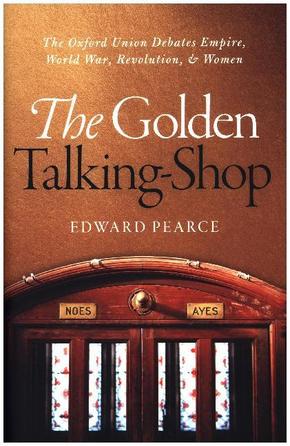The Golden Talking-Shop - The Oxford Union Debates Empire, World War, Revolution, & Women
| Verlag | Oxford University Press |
| Auflage | 2016 |
| Seiten | 690 |
| Format | 16,9 x 24,3 x 5,5 cm |
| Print PDF | |
| Gewicht | 1016 g |
| Artikeltyp | Englisches Buch |
| ISBN-10 | 0198717237 |
| EAN | 9780198717232 |
| Bestell-Nr | 19871723EA |
The story of Britain - and the world - in the first half of the twentieth century, as seen from the perspective of the world's most famous debating society. A vivid, sometimes piquant, picture of a Britain that is now passing from living memory - and a powerful reminder of the ways in which the past really is a foreign country.
In the late 1890s, Britain was basking in the high noon of empire, albeit with the sobering experience of the Boer War just around the corner. By 1956, the year of the Suez debacle and less than a lifetime later, the age of empire was drawing rapidly to a close and Britain's position as an independent great power was over. In between, the country had experienced two devastating world wars. India - the jewel in her imperial crown - had gained independence. And there had been far-reaching changes on the domestic front: the birth of the welfare state, full men's (and eventually women's) suffrage, and the foundation of the National Health Service, to name but a few.
Throughout this momentous period, the Oxford Union, the world's most famous debating society, continued to meet to debate and discuss the changing world around them. Sometimes their debates had important repercussions in the wider world - such as the notorious 'King and Country' debate of 1933 which made headlines around the globe and which Winston Churchill described as that 'abject, squalid, shameless avowal.' More often than not, the debates had merely a local impact, even if among the debaters were many of the leaders, thinkers, and opinion formers of the future, figures such as Harold Macmillan, Archbishop Temple, Edward Heath, and Tony Benn.
In The Golden Talking Shop, former Parliamentary sketch writer (and Union member) Edward Pearce tells the story of Britain - and the world - in the first half of the twentieth century as seen from the perspective of these Union debates: sometimes shocking, sometimes wittily amusing, and often both. The students do most of the talking, along the way revealing the changing preoccupations, prejudices, and assumptions of their changing times. A distinct pre-First World War fashion for Social Darwinism is in due course replaced by a widespread 1930s penchant for Stalinism, with civilized opinion reliably breaking in on occasion too. Above all, b rowsing these debates, taken straight from another age, gives the reader a vivid, sometimes piquant, sense of a Britain which is now passing from living memory - and serves as a powerful reminder of the ways in which the past and its attitudes really are a foreign country.
Inhaltsverzeichnis:
Introduction
Early Days
1: Our Empire 1896-1899
2: South Africa - Last, Late Prize 1899-1900
3: Chamberlain and Milner at War 1901-1905
4: Enter the Liberals 1905-1908
5: 'The Whole University Marching Down the High in Uniform' 1909-1910
6: Mourning their Lordships, Worrying about Women 1911
7: Wales, Women, and Balkan War 1912-1913
8: On the Eve 1913-1914
9: The Threshold of the New 1919-1921
10: The Consequences of the Peace 1921-1922
11: The Rather Circumspect New World 1922-1925
12: Imperial Fatigue and New Clouds 1926-1930
13: The Old Familiar Faces 1930-1935
14: We go into the Dark 1935-1940
15: The Sunlit Uplands Almost 1945-1949
16: All Sorts of Dangerous Modern Ideas 1949-1951
17: The Old Order Not Changing Very Much 1951-1955
18: Invading Countries is Wrong 1955-1956
Envoi

